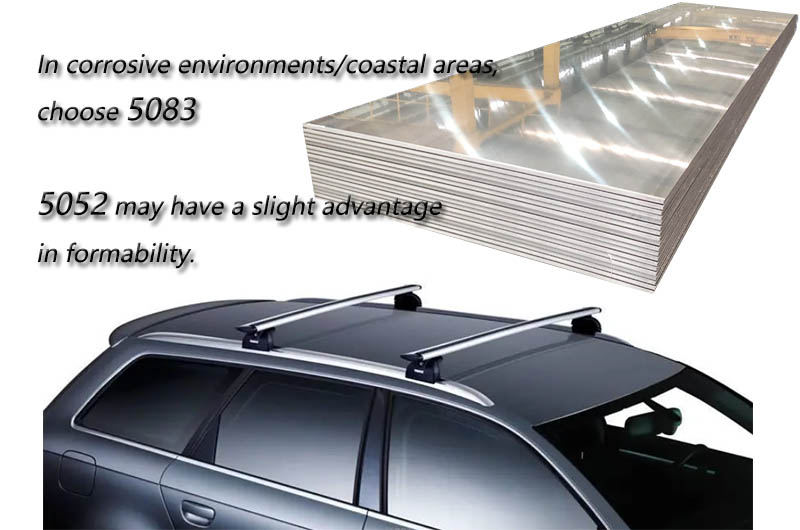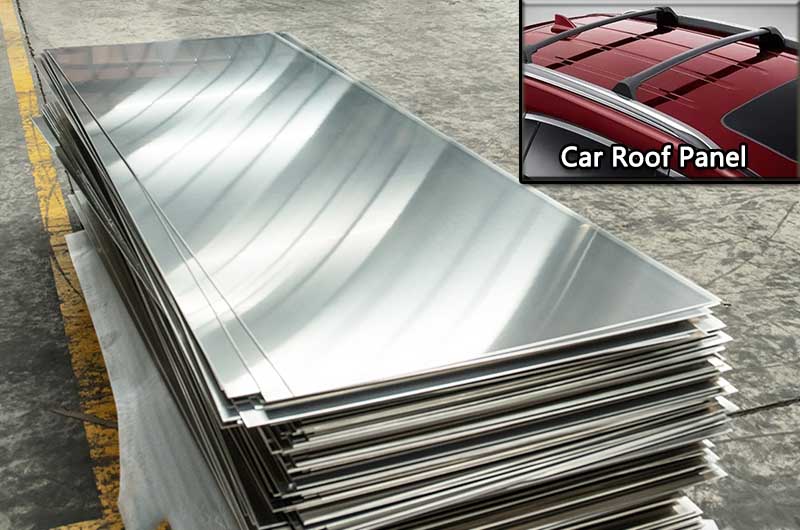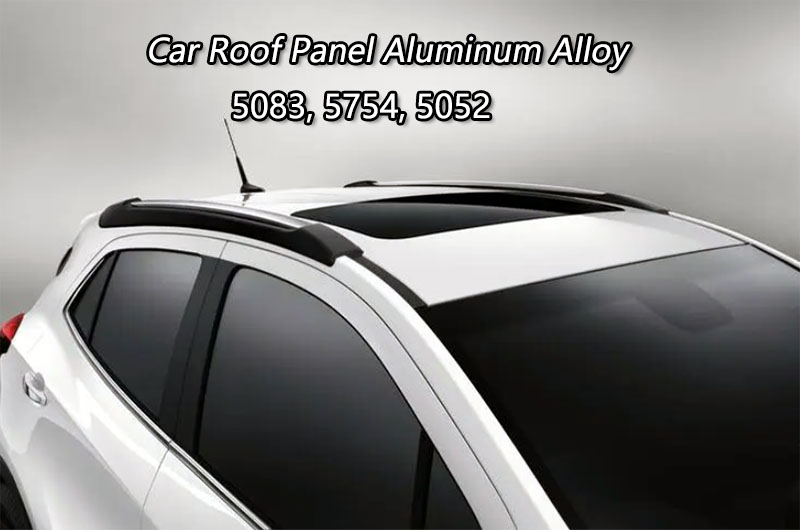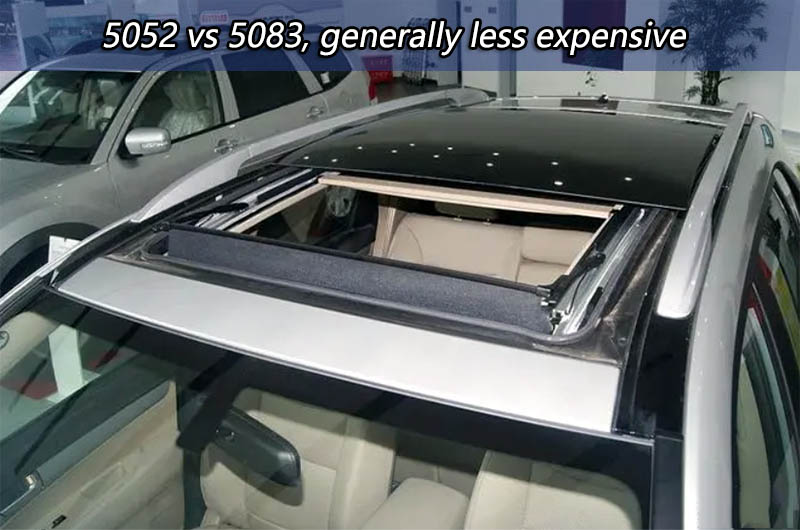Automotive Aluminum Plate for Car Roof Panel
Alloy: 5052/5083 Specification Customization
An automotive roof panel, also known as a roof skin or roof panel assembly, is an integral part of a vehicle's structure, forming the topmost portion of the passenger compartment.
The application of aluminum alloy on the body is also becoming more and more extensive. The 5052 aluminum plate used for the roof of the car has good plasticity, easy forming, a high recycling rate, energy saving, and environmental protection.
The 5083 aluminum sheet for the roof of the car has good formability, corrosion resistance, weldability, and medium strength. The density of the aluminum alloy for the lightweight of the car is only 1/3 of that of steel, and it has good thermal conductivity. The machining performance is 4.5 times higher than that of iron. times, so aluminum has become an ideal material for realizing the lightweight of automobiles.

Automotive Aluminum Plate for Car Roof Panel Functions
- Structural support: Automotive Aluminum Plate provides structural integrity to the body by connecting the front and rear struts, enhancing the overall rigidity of the car. It helps ensure the overall safety of the occupants in the event of a rollover or collision.
- Protection from the elements: The Car Roof Panel acts as a barrier between the interior of the vehicle and external elements such as rain, snow, sun, and debris. It helps keep passengers dry and protects them from adverse weather conditions.
- Noise and Vibration Reduction: The Car Roof Panel, along with other parts of the Car Body, helps minimize external noise and vibration for a quieter, more comfortable driving experience.
- Aerodynamics: The shape and design of the Car Roof Panel optimize aerodynamics. A well-designed roof panel can reduce drag, increase fuel efficiency, and help improve the overall performance of your vehicle.

Automotive roof panels are often made using different materials including steel, aluminum, and composites. Steel panels offer durability and cost-effectiveness, while aluminum panels offer lightweight advantages and improved fuel efficiency. Composite materials such as carbon fiber reinforced polymer (CFRP) combine lightweight construction with high strength but are generally more expensive.
The manufacturing process of automotive roof panels involves stamping or pressing the selected material into the desired shape, followed by additional steps such as trimming, welding, and surface treatment.
NOTE: The exact design, material, and construction of your vehicle's roof panel may vary by vehicle make, model, and manufacturer. Roof panels may vary in size, shape, and features from model to model to accommodate different body styles such as sedan, SUV, coupe, or convertible.
Automotive Aluminum Alloy for Car Roof Panel
| Automotive Component | Aluminum Alloy |
|---|---|
| Car Roof Panel | 5083, 5754, 5052 |
| Underbody Shield | 5083, 5754, 5052 |
| Air Tank | 5083, 5754, 5052 |
| Door | 6061 |
| Front and Rear Covers | 6061 |
| Lifter | 6061 |
| Fender | 6061 |
| Wheel Hub | 6061 |
| Power Battery Casing | 3003 |
| Power Battery Core Foil | 1235, 1060, 1070, 1100 |

5052 Automotive Aluminum Plate for Car Roof Panel
- It is a non-heat treatable alloy with good corrosion resistance.
- Has excellent formability and high strength.
- Due to its versatility, it is widely used in various industries including automotive.
- It has good resistance to atmospheric conditions and is suitable for automotive roofs.
- Often available in various thicknesses to meet specific design requirements.
5083 Automotive Aluminum Plate for Car Roof Panel
- It is a non-heat treatable alloy with excellent corrosion resistance.
- Has high strength, especially in marine environments.
- Widely used in marine and offshore applications, also suitable for automotive use.
- Provides good formability and weldability.
- Has excellent resistance to salt water, making it a durable choice for automotive roofing.
| Mechanical Property | 5052 Aluminum Alloy | 5083 Aluminum Alloy |
|---|---|---|
| Tensile Strength | 210-260 MPa | 270-345 MPa |
| Yield Strength | 145-195 MPa | 155-275 MPa |
| Elongation | 12%-20% | 12%-16% |
| Hardness (Brinell) | ~60 HB | ~75 HB |
The 5052 and 5083 aluminum alloys are proven effective in automotive applications, including automotive roof panels, due to their corrosion resistance, strength, formability, and overall performance. The specific choice between these alloys may depend on factors such as design requirements, cost considerations, and intended applications within the automotive industry.

How to Choose Automotive Aluminum Plate for Car Roof Panel?
Several factors should be considered when selecting 5052 and 5083 aluminum alloys for automotive roof panels. Here are some key points to help you make an informed decision:
- Strength and Durability: Evaluate the required strength and durability of automotive roof panels based on specific vehicle models and usage conditions. Both 5052 and 5083 alloys have good strength, but 5083 has higher strength characteristics, especially in marine environments. If the car will withstand harsh conditions or require extra strength, 5083 may be the first choice.
- Corrosion Resistance: Consider the exposure of automotive roof panels to moisture, salt water, chemicals, and other corrosive elements. Both alloys have good corrosion resistance, but 5083 has excellent resistance to salt water. If the car is regularly exposed to corrosive environments or coastal areas, 5083 may be a better choice for long-lasting performance.
- Formability and Weldability: Evaluate the formability and weldability properties required for automotive roof panels. Both 5052 and 5083 alloys have good formability and weldability, but 5052 may have a slight advantage in formability. If the automotive roof requires complex shapes or intricate designs, 5052 may be easier to work with during manufacturing.
- Cost Considerations: Compare the cost of the two alloys based on availability, market price, and any other processing requirements. The cost of 5052 aluminum alloy is generally lower compared to 5083, which may be a factor to consider if cost effectiveness is a priority.
- Weight Considerations: Assessing the weight requirements of automotive roof panels, as aluminum alloys are chosen for their lightweight properties. Both alloys are relatively low in density, but 5052 is slightly lighter than 5083. If weight reduction is critical to the overall performance of the vehicle, the 5052 may be a good choice.
Specific guidance can be provided based on the vehicle's design specifications, performance requirements, and other relevant factors. Performing a thorough research and analysis will help you make an appropriate selection based on the specific needs of your car roof.
Recommended content you might be interested in
-
5182 Automotive Aluminum Plate Sheet
5182 Automotive Aluminum Plate Sheet has a flat shape, high quality, good corrosion resistance, good weight reduction, and energy-saving effects, and its safety and comfort are better provided.
-
5083 Automotive Aluminum Plate Sheet
5083 Automotive Aluminum Plate Sheet has good formability and can be easily formed into various auto parts by rolling, bending, stamping, and other processes.
-
5754 Automotive Aluminum Plate Sheet
5754 Automotive Aluminum Plate Sheet has good formability and can be easily formed into various automotive parts by rolling, bending, and stamping processes. It can be formed into complex shapes while maintaining its strength and integrity.
You might like the following content
-
5083 Aluminum Plate Sheet
5083 aluminum plate is a non-heat treatable alloy with high strength and corrosion resistance. We offer a wide range of sizes, thicknesses, and specifications at affordable prices to meet customer-specific needs.
-
5052 Aluminum Plate Sheet
5052 aluminum plate is mainly composed of magnesium and chromium. It has good processability, medium static strength, high fatigue strength, and good weldability. The fatigue strength of 5052 aluminum alloy is higher than most aluminum alloys.
-
5083 H32 Aluminum Plate Sheet
5083 H32 aluminum plate has excellent corrosion resistance, good weldability, and high strength. The surface of the 5083 h32 Aluminum Plate has no oil spots, no waves, no scratches, no roll marks, and meets the production standards.
-
5005 h32 Aluminum Plate Sheet
5005-H32 aluminum is 5005 aluminum in the H32 condition. To achieve this state, the metal is strain-hardened and then stabilized to about one-fourth the strength between annealed (O) and fully hard (H38).

